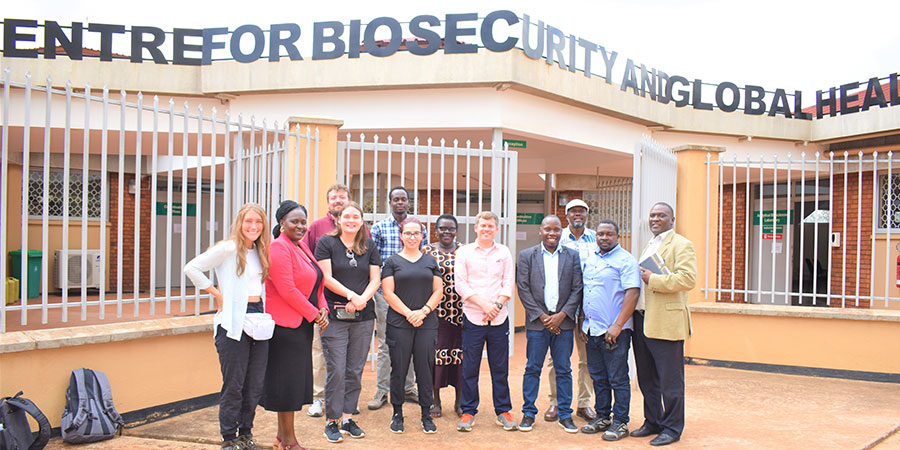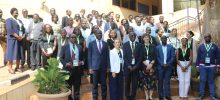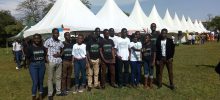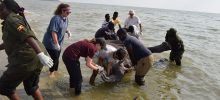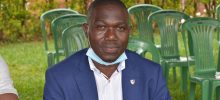CoVAB’s 2022 Summer School and International Boma come to a close.
The College of Veterinary Medicine, Animal Resources, and Biosecurity successfully completed the 2022 Summer school and the International Cultural Boma that was held on the Theme; Tropical Veterinary Medicine and One Health in Uganda: A need for partnership and collaboration for development.
Students from the Mississippi State University, College of Veterinary Medicine, USA took part in a one-month summer school organized by the college.
Following the completion of the activity, a Boma which is a knowledge sharing and exchange session was convened at the College in partnership with AFROHUN Uganda on Friday 1st July 2022. It brought together students under the One health program as well as students from Mississippi State University USA.
Prof. James Okwee Acai, the Deputy Principal on behalf of Principal Prof. Nobert Frank Mwiine welcomed the participants to the knowledge-sharing opportunity where CoVAB and Makerere University as a whole was sitting together with Mississippi State University and AFROHUN to share experiences and what was learned in Tropical Veterinary Medicine as well as getting to know what happens outside the said sphere.
‘It is in the interest of sharing information to identify and address challenges that affect life’, said Prof. Okwee while extending his appreciation to Mississippi State University for the over ten-year relations it has had with the College despite the challenges. He said what started as a summer school may not only last but grow into problem-solving partnerships in research, training, and community development.
The Team Leader from Mississippi University Prof. Stephen Reichley appreciated CoVAB for the lead role in organizing the one-month-long Summer School that brought his students into contact with a new area with most of them being in Africa for the first time. He said the summer school was opening up opportunities for further collaboration in areas like student exchange programs as well as graduate research. It was a great experience for the students to move out of their area to the unknown and the exposure left lifelong in print on the students’ academic, practice, and outlook towards the life he noted.
Dr. Gabriel Tumwine the Summer School coordinator said the one-month expedition by the students from Mississippi State University was a great field experiential learning opportunity using one health approach. He said the deliberation in the Boma was an opportunity for the organizers to get feedback that would inform the subsequent summer school and Boma. Tumwine commended Dr. Sente for keeping with the team while in the field all through. He took cognizance of the students from AFROHUN who were taking part in the Boma to share their experiences and lessons learned from their placements in various parts of the country and the projects they handled within the communities.
In a presentation by Dr. Peninnah Nsamba, a veterinarian and Virologist, it was explained that effort has been on to bring the one health concept to the forefront by showing students that it was not only their individual professions that mattered rather a synergy was necessary for the needed balance and multi-sectoral approach in addressing community challenges. She highlighted some of the successes realized to date and these included bringing together students from various disciplines and colleges in Makerere and other Universities who through a didactic course commit to solving community challenges in a holistic approach.
The Mississippi State University students that including Katie Ann Stanley, Brook Taylor Dominello, and Jordan Leigh McCoy presented a report about their field experiences that took them into contact with various disciplines including Aquaculture and fisheries, conservation, the abattoirs, diary production, the national parks, small animal clinics as well as agriculture.
They appreciated attendant factors like religion that formed part of the reason for family cohesion as one thing that struck them. They appreciated the creativity among Ugandans in the way they handled different Veterinary issues but called for improvement in the abattoirs and slaughterhouses as well as general animal welfare.
Similarly, students in the 2021 AFROHUN cohort presented reports where they shared their field experiential learning. Using the one health concept that was developed to appreciate the interconnectedness of every sector, environment, human and animal, the students explained that the experiences helped them appreciate a lot of things and supported the host communities solve some of the identified and prioritized challenges. The Areas visited included slaughterhouses and the problems identified included lack of protective gear, people involved in self-medication, and the associated risk of microbial resistance. The other community challenge handled was sharing water sources by animals and humans in Palisa and how the situation was addressed together with the community leadership.
Dr. Claire Mugasa, the Dean School of Biosecurity, Biotechnology and Laboratory Sciences (SBLS) formerly closed the Boma and congratulated all the teams for having completed the program as scheduled. She said their participation was an opportunity for shared learning and she extended the College’s appreciation to AFROHUN for the opportunity given to students of various disciplines to work on real-life challenges using the one health approach. She was happy to learn that the principles learned were put into practice and was optimistic that the future was bright with more and more people working towards the realization of the one health approach.
The International Cultural Boma as a concept in an African context means a meeting that allows learning and a two-way exchange of information between elders and youngsters. African culture involves the transfer of wisdom and knowledge from the wise, knowledgeable, and highly experienced elders to the young that are mentored into responsible community members. The concept was therefore used to allow the opportunity to share knowledge from all stakeholders as experienced in the course of learning.
PICTORIAL

Prof. Stephen Reichley makes remarks during the Boma at CoVAB

Dr. Peninnah Nsamba makes her presentations on the One Health succeess story

Summer school participants listen to other peoples experiences

Dr. Claire Mugasa hands over certificates to participants at the close of the Boma

Deputy Principal CoVAB Prof. Okwee makes his remarks at the Boma

Out in the field of Conservation, just next to a rhino

Summer Schoolers out in the filed attending to kids


